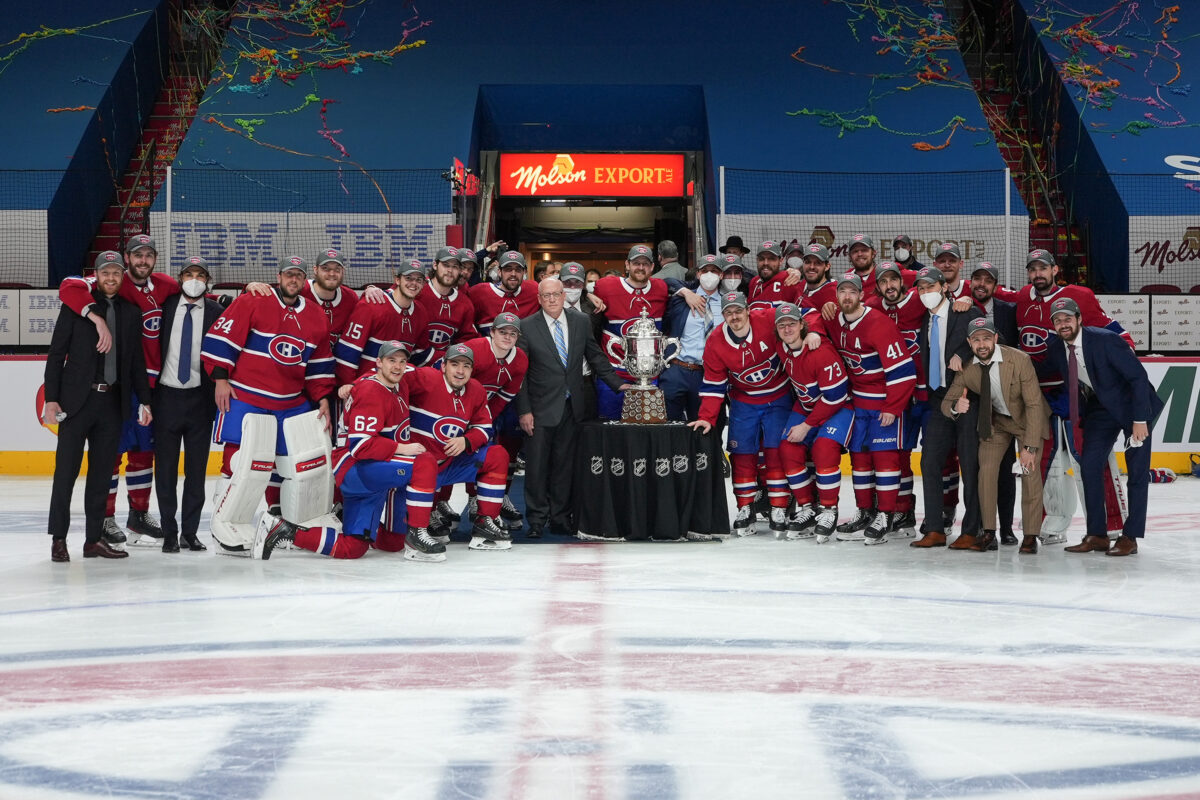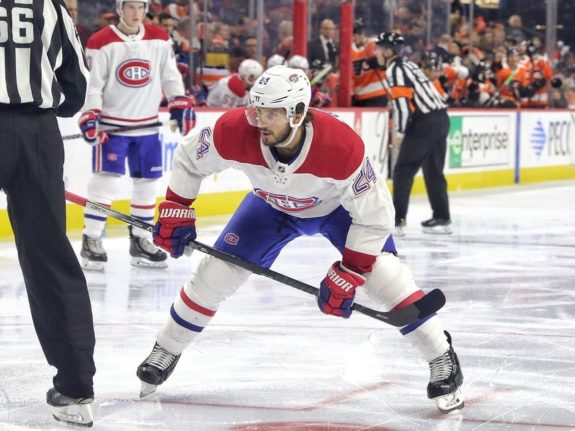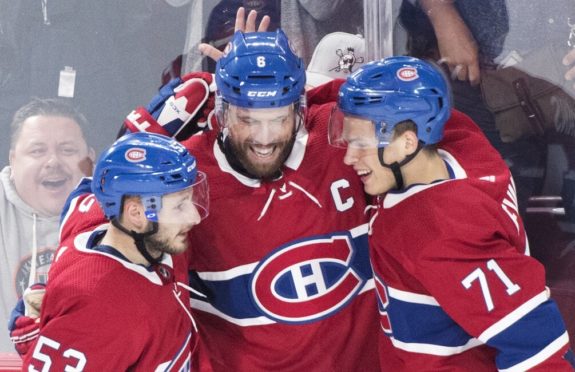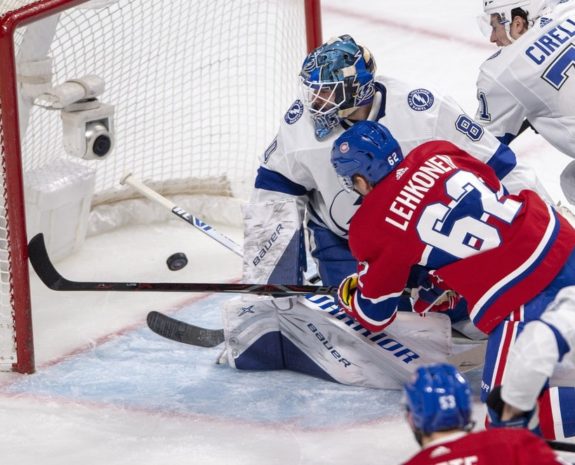After unexpectedly reaching the Stanley Cup Final these past playoffs, the Montreal Canadiens are under the gun not so much to replicate the feat in 2021-22. They’ll be hard-pressed to just make the playoffs in the first place.

It’s not impossible by any stretch. After all, stranger things have happened, namely the Habs as just mentioned reaching the Final only to be unceremoniously dispatched in five games by the champion Tampa Bay Lightning. However, if the Canadiens are going to put together a successful campaign this coming season, they’re going to have to overcome a variety of obstacles. Here are the top three:
3. A No. 1 Line No More?
There is no disputing the Canadiens’ depth up front took a beating this offseason. Case in point, the No. 1 line of Phillip Danault, Tomas Tatar and Brendan Gallagher is no more, with only Gallagher staying put following the exodus via unrestricted free agency of his ex-brothers in arms.
To be fair, it’s more so by choice than anything else on the part of the Canadiens. For example, Danault had reportedly turned down a six-year, $30 million contract. Sure, Danault is a perennial top-10 finisher in Frank J. Selke Trophy voting at this stage of his career, but, considering his mediocre production at the other end of the rink, you have to think that was the absolute highest Canadiens general manager Marc Bergevin was going to go.

The Los Angeles Kings giving Danault $33 million instead kind of proves the point. For Danault to stay, Bergevin would have had to match that total at the very least. In a flat-cap world, that’s asking a lot. So, letting Danault hit the market, was the undeniably cost-effective choice.
With regard to Tatar, after the forward was healthy-scratched throughout the playoffs, it’s plain to see the Canadiens wanted to pursue other options. Whether Tatar’s ultimately replaced by Mike Hoffman opposite Gallagher remains to be seen, potentially on other side of Jesperi Kotkaniemi, as the Finn gets set to theoretically move up the lineup. So, will Nick Suzuki and his linemates, Cole Caufield and Tyler Toffoli, in principle, as the two young centers look to take the next step in their development.
Ultimately, Gallagher alone doesn’t make a line the top unit. He was arguably the straw that stirred the drink beside Danault and Tatar, but, with Suzuki having led the Canadiens in scoring for two straight playoff runs, it’s highly likely he would have overtaken Danault this coming season anyway as the team’s No. 1 center. Considering he’s just 22 and yet to peak in all likelihood, rumors of the demise of the Canadiens’ offense have been greatly exaggerated. They might have lost one No. 1 line, but they had another waiting in the wings to take its place.
2. Weber Presumably to Be Put on LTIR
In retrospect, reports that Shea Weber could miss all of this season are far from surprising. Sure, he played relatively well during the playoffs, with much of the media making a big deal of the Canadiens’ top four defensemen shutting down the opposition on their road to the Final. However, during the regular season, Weber’s play left a lot to be desired.
In that sense, the ability to conceivably put Weber on long-term injured reserve (LTIR) and use the cap space to replace him is a great option to have. In the shape Weber’s in, the Canadiens couldn’t have realistically expected much out of the 36-year-old, making almost anyone at all a potential upgrade. That theoretically includes David Savard, who signed a four-year, $14 million deal with the Canadiens this offseason.
Now Savard won’t replicate Weber’s offense, even the low-by-his-standards six goals and 19 points he scored last season. However, if he’s smart, head coach Dominique Ducharme, who did just reach the Final, won’t be replacing Weber with Savard straight up, as expecting Savard to play Weber’s 22-plus minutes is lunacy. Savard didn’t even play 20 per game with the Columbus Blue Jackets prior to getting traded to the Lightning, with whom he played just over 14 in the playoffs (11 less than Weber). It’s more so going to be a case of replacing Weber by committee.

It also forces the Canadiens to become more creative on the power play, opening up more options than simply turning to Weber’s one-timer and also opening the door for Jeff Petry to become the team’s undisputed No. 1 defenseman. While the Canadiens would prefer to have Weber back, the truth of the matter is Petry had technically already usurped him in terms of ability and driving play the other way (and ice time, leading the Habs with 22:44 per game during the regular season).
Much like with the situation up front, in which Suzuki will for all intents and purposes take on the role of No. 1 center after having grown into it, Petry should be up to the challenge. Of course, the Habs will miss certain aspects of Weber’s game, such as his leadership and his physicality, but giving Petry more responsibility doesn’t have to be a bad thing. Even if Ducharme is forced to tinker with his strategy to make up for the loss of Weber on defense, it’s hard to believe he’ll ask Petry to change his game and Petry doing more of what Petry does best is a good thing.
1. Return to the Atlantic Division
Unfortunately for the Canadiens, Nikita Kucherov’s stint on LTIR only to be activated come the playoffs and dominate wasn’t the only bit of foreshadowing to take place during the Stanley Cup Final. Of course, many Habs fans are hoping Weber will be able to come back healthy in time for the 2022 playoffs, but they first have to make them.
It’s going to be a tall order considering the Lightning have had their way with the Canadiens in the recent regular-season past as co-members of the Atlantic Division. In fact, the Lightning swept the Canadiens in 2019-20. Now they will have to regularly contend with them and the likes of the Florida Panthers, Boston Bruins and Toronto Maple Leafs as the division(s) reform after travel restrictions made a temporary realignment in 2020-21 necessary.

Ultimately, it’s very possible the Canadiens finish out of the top three seeds. Assuming the same playoff format as in 2018-19, that would leave two wild-card spots. Considering the Canadiens just made the playoffs by the skin of their teeth in an all-Canadian division they were supposed to dominate in principle, securing one of them won’t be easy, especially when you take into account the Metropolitan featuring the likes of the:
- Carolina Hurricanes
- New York Islanders
- Pittsburgh Penguins
- Washington Capitals
Some teams will logically take steps back. Maybe the Bruins, without David Krejci and Tuukka Rask, and Hurricanes, without Dougie Hamilton and Alex Nedeljkovic, do just that. Those are still very good teams though, and, if the Ottawa Senators and New York Rangers, for two examples, progress towards becoming playoff teams as well, the Canadiens are effectively right back to being on the bubble.
Not to burst that of Habs’ fans, but next season is realistically going to come down to the wire. Of course, this last one did too and it was an unparalleled success dating back almost 30 years. Not to dwell on the failure of the Final, but losing is a potential option. Losing hope, though? Never, not with this incarnation of the team anyway.
